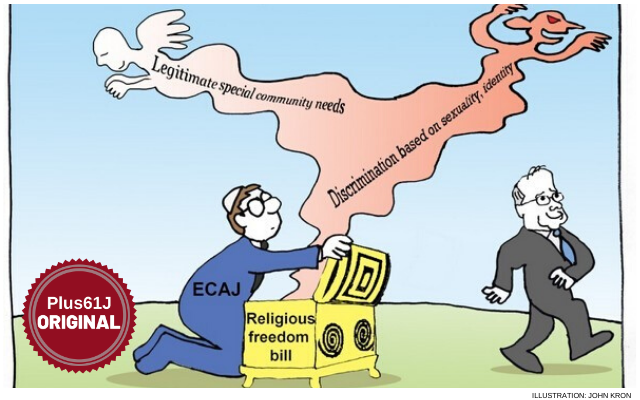Published: 20 March 2020
Last updated: 4 March 2024
SINCE THE FEDERAL GOVERNMENT opened a legislative Pandora’s Box in seeking to protect the already-protected “religious freedom”, Jewish organisations (though not all) have joined the ruling bodies of Catholics, Anglicans, Christian Orthodox churches, Imams et-al in submitting their wish-lists. That is, seeking to protect the religious from discrimination by boosting their rights to discriminate against others.
In case you’ve been sleeping for the past year and a bit, a brief recap of events. Hardline Christians, and a smattering of other zealous types, lost their vocal fight against same-sex marriage. Then Israel Folau paraphrased on social media a quote from Corinthians that condemns homosexuals, adulterers, atheists (everyone, really) to hell and Rugby Australia terminated his contract— a case some of us saw as managerial overreach calling for a remedy in employment law, but which the faithful saw as religious martyrdom.
So, as the federal election loomed, the Government, headed by a Pentecostal Prime Minister, tossed to the Coalition’s political base the red (un-kosher) meat of new religious freedom laws.
The Government’s first bill sparked a religious revolt for not going far enough. The second version, released in December, still has problems, say religious groups. Human rights groups, on the other hand, say the proposals go too far, giving religious people a “sword” to castigate gays, women and others in workplaces, businesses and elsewhere so long as such nastiness qualifies as a “statement of religious belief” and falls short of “serious intimidation”.
In January, the Executive Council of Australian Jewry, the Jewish community’s peak body, made a submission to the Government on the second bill.
I have few quibbles with the submission’s content— rather, a fundamental disagreement with its philosophical settings around Jewishness. For instance, the ECAJ is concerned that Jewish charities, services and institutions be allowed to keep “preferring” Jews on their staff, on their boards and as clients.
The ECAJ sensibly argues that “having to find a religious basis for preferring persons of a faith community in the provision of aged care, accommodation and social services is not straightforward.”
Undeniably the Jewish community has special needs in caring for the diminishing ranks of Holocaust survivors, many of them revisited by trauma in old age. The bill allows a religious body to preference people of the same religion if it does so “in accordance with the doctrines, tenets, beliefs or teachings of that religion.” The ECAJ sensibly argues that “having to find a religious basis for preferring persons of a faith community in the provision of aged care, accommodation and social services is not straightforward.”
But neither is it straightforward, when it comes to hiring, to substitute the religious basis for discrimination with an explicitly racial basis. Jewish nursing homes must employ staff who are sensitive to the experience of survivors. Most of the time the job candidates best meeting that criterion will be Jewish. The task is about finding the right person for a difficult role. Reducing the equation to a matter of DNA seems a spiritually impoverished approach.
It is also one of several examples of the ECAJ straining to squeeze Jewishness— which even has a linguistic character when it comes to Hebrew or Yiddish speakers— into the bill’s narrow framework of faith and religious belief.
The ECAJ wants laws that will unambiguously allow Jewish nursing homes, schools and so on to service their own kind first. Are non-Jews insisting on a right of entry to these institutions? If they ever suddenly flood to Jewish institutions, the Jewish community will be confronting an existential problem that no tightly drafted clause can fix.
One thing the submission omits to mention is that discrimination to preserve an institution’s religious ethos naturally cuts both ways. It follows that a Jew seeking entry into, say, one of the highly sought-after Catholic nursing homes might find themselves turned away in “good faith” as the home preferences its own kind. Jewish communal leaders appear to tacitly accept this quid pro quo on discrimination even at the potential expense of needy individuals from their own tribe.
As to the bill’s “sword” provisions establishing the devout’s right to air their bigotry— critics say the new laws might allow a boss to call a gay employee “broken”, and so on — the ECAJ sees the criticism that the laws open the door to denigration of people as overstating the case. But the “messaging” is another matter, the submission says.
“Accordingly the government should consider taking other measures, outside the bill itself, including clear public announcements, in order to negative (sic) any suggestion that the government is encouraging or sanctioning statements that disparage or are disrespectful of people on the basis of their faith, sexual orientation or identity, or any other personal attribute, even if the statements are allowed under the bill and the current law.”
So there’s some gratuitous PR advice from Jewish community leaders to the Government. Advice that suggests these leaders are either naive about the political genesis of the Government’s religious freedom agenda, or they’re pretending to be. (They’re likely also self-sabotaging because, frankly, I can already hear the emboldened mutterings about Christ killers, interlopers in the Holy Land and every other anti-Semitic trope festering under the umbrella of faith.)
Indeed, when it comes to PR advice, it’s the communal leaders who could use some. And that’s because the Government used the Jewish community for PR when, in August, it launched The Religious Discrimination Bill at Sydney’s Great Synagogue. The rabbi, Dr Benjamin Elton, said he was “honoured and delighted” to host the occasion as religious discrimination is an important issue for the Jewish community, as well as other faith groups.
At the time, I wrote in The Age that the launch venue gave the Government “a fig leaf in the shape of a Torah scroll,” apparent proof Scott Morrison is fair dinkum when he characterises the religious freedom push as belated recognition of Australian “multiculturalism.” As if there’s something more edifying going on than a sop to the Christian Right. There isn’t.
In hosting the launch Jewish communal leaders were either played by the Government or consciously played along with it.
One thing the submission omits to mention is that discrimination to preserve an institution’s religious ethos naturally cuts both ways. It follows that a Jew seeking entry into, say, one of the highly sought-after Catholic nursing homes might find themselves turned away in “good faith” as the home preferences its own kind.
In truth, Jewish leaders find themselves wedged between a socially liberal constituency — the two most identifiably Jewish electorates, Sydney’s Wentworth and Macnamara (formerly Melbourne Ports), voted “yes” to same-sex marriage in numbers greater than almost everywhere else in the country — and the possibility that Jewish institutions might gain from the new laws.
As these two opposing forces cannot be married, we’re watching the leaders dancing, clumsily, to the Government’s tune.
Illustration: John Kron




